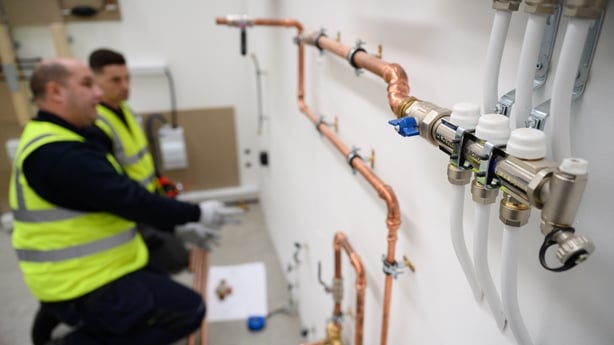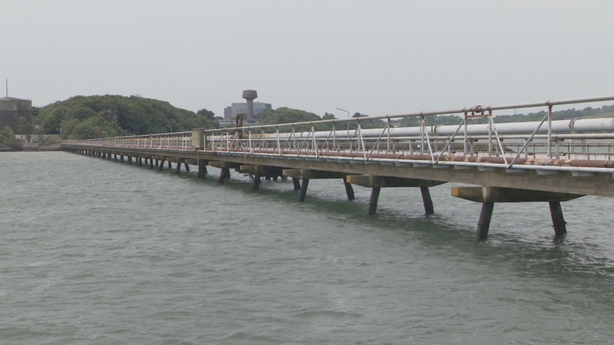If a single sentence stating that biofuels could be used to reduce greenhouse gas emissions in home heating were to be included in today's Budget, it could save the country €35 billion of unnecessary spending.
That's according to the Alliance for Zero Carbon Heating which represents the home heating sector.
It says the emissions reduction targets for the household sector cannot be achieved by heat pumps and retrofitting alone, but that Hydrotreated Vegetable Oil would deliver emissions reductions of up to 90% at a fraction of the cost.
Official figures published by the Sustainable Energy Authority of Ireland (SEAI) last month show its now costing homeowners €38,200, over and above the Government grants, for the average comprehensive energy upgrade - a so-called "deep retrofit".
Many simply cannot afford that. And even if they could afford it, the age and structural fabric of lots of older houses are just not "heat pump ready".
Then there is the issue of whether it makes economic sense for a person to invest hard-earned savings in some energy upgrades.
The National Heat Study published by the SEAI in February last year included a deep analysis of how long it takes for the financial savings delivered by certain energy upgrades to cover the cost of installing the upgrades in the first place.
That analysis showed that in a detached house previously heated by oil, it would take 229 years to recover the cost of floor insulation, 40 years for high efficiency glazing to pay off, and 28 years for solid wall insulation to pay for itself.
The quickest pay off periods were seven years for draught proofing, nine years for cavity wall insulation, and 14 years for roof insulation.
Younger homeowners with longer time horizons and the prospect of incomes rising into the future might be prepared to make such investments.
But older homeowners with fewer years to wait for a payoff and more limited income horizons may be less inclined.
Many of them might argue that surely heat pumps - with all the investment, upheaval, and paraphernalia that comes with them - cannot be the only solution.
But heat pumps, and only heat pumps, are the cornerstone of the Climate Action Plan for reducing greenhouse gas emissions from domestic heating.
Those who can't or don’t make the transition to heat pumps will be subject to ever increasing carbon tax on the fossil fuels they use.
Of course, some households will receive higher social welfare fuel allowances in compensation. But so far there's no escape for those who don't qualify for the fuel allowance.
The Alliance for Zero Carbon Heating is a new representative body for trade associations and manufacturers in the home heating industry.
It cannot understand why the Government has put all the emphasis in the Climate Action Plan onto heat pumps.

They are convinced that such a narrow focus on heating technologies will not achieve the desired transformation especially in rural Ireland.
This Alliance points out for instance, that it is impossible to achieve the target in the Climate Action Plan of 400,000 energy upgrade retrofits by 2030. That would require 1,000 retrofits to be completed every week, between now and 2030 and they claim that this cannot be done.
There is a significant shortage of the skilled tradesmen required and those tradesmen are also needed for the delivery of another 200,000-brand new energy efficient homes by 2030.
Where are all the qualified workers coming from? And what about the almost 700,000 homes in Ireland with liquid fuel boilers for central heating and hot water?
These are mostly in rural areas or located off the gas grid.
About two million people live in those houses. Typically, they each use between 1,000 and 1,500 litres of the fossil fuel kerosene per year. This results in 4.5 million tonnes of carbon dioxide emissions between them all each year.
Those houses tend to be poorly insulated. They have low BER ratings and often older homeowners who can least afford to spend the average €38,000 that the SEAI says is needed for a deep retrofit.
The Alliance for Zero Carbon Heating says the Government needs to look at all options and that electricity and heat pumps should not be "the only show in town" when it comes to the Climate Action Plan.
It says customers must be given a choice and want non-fossil-fuel Hydrotreated Vegetable Oil for heating to be made accessible and affordable to all.
The Alliance points to technological innovations in central heating boilers which can now run very efficiently on HVO.
This enables them to deliver a 90% reduction in greenhouse gas emissions compared to traditional home heating fuel at a fraction of the cost of the comprehensive home energy retrofit upgrade.
HVO is made from plant waste, used cooking oil, animal fats and other renewable materials. It is a clear, odourless, silky, see-through liquid with a slightly greenish tinge. It is refined in various locations around Europe and distributed in Ireland by two big companies, Certa and the Tria Group.
The beauty of switching to HVO for home heating, according to the industry, is that it only requires a small bit of adjustment to existing home heating boilers.
It is a so-called "drop-in solution" with no big expense for homeowners. Longford County Council has taken a lead on this issue.
It has switched to burning HVO instead of kerosene in the boilers that heat its council offices.
It did this because it would have required some very significant and expensive long-term investments to make their older office building heat-pump ready.
The Council recognised that HVO could bridge the gap between now and a time in the future when they would be in a position to invest in and deliver the required office energy upgrade.
For only a small cost it is now hoping to see very significant savings in greenhouse gas emissions.
Director of Services, Infrastructure, and Climate Innovation at Longford County Council, Samantha Healy, said this is the first winter the Council will be using the new system. It will monitor its carbon emissions and energy use and is expecting to see some excellent results.
CEO of Fuels for Ireland Kevin McPartlan says that HVO emerged as a drop in substitute for home heating oil very quickly over the past two or three years because technologies have improved, and the feedstocks became more available.
There is scope also for biofuels to be produced in Ireland which Mr McPartlan says could be important for energy security.
He accepts that HVO is not a perfect fuel but says that a perfect fuel does not exist.
"It is probably the best product right now for dramatically reducing carbon emissions from heating in a place that is not yet suitable for electrification and the installation of a heat pump. It is about changing the fuel rather than changing the heating system", Mr McPartlan says.

However, environmental groups have some major concerns about HVO.
Some see it as a bit of a con job. There are claims of large-scale fraudulent labelling going on in global markets to falsely present the HVO feedstock distributed in Europe as being sustainably sourced.
For instance, sustainably sourced HVO is supposed to come mainly from refined used-cooking-oil and waste animal products. Much of the supplies of used cooking oil coming into Europe for HVO production are from Malaysia. Yet it is claimed that Malaysia’s stated exports of used cooking oil are multiples of the what the country could possibly produce.
The suspicion being raised by environmental groups is that some of the feedstock for European HVO may in reality be secretly coming from virgin palm oil plantations, the cultivation of which would require rain forests to be cut down and biodiversity to be destroyed.
Mr McPartlan accepts that there are concerns about the feedstocks being used to create biofuels.
But he says his members are the only people importing HVO oil into Ireland. They ensure that what comes in meets the highest possible international sustainability and carbon certification levels.
Kenneth Long, the Terminal Manager at the massive Green Biofuels storage facility in Ringaskiddy, is equally adamant about the sustainability of the HVO coming in.
"Our HVO comes from Antwerp. It is refined for us by a company in Holland called Neste. There is no palm oil involved. Everything that we have is fully certified - from the first raw ingredient through to the finished product that we sell. Everything is fully sustainable", he insisted.
Mark Doyle is the General Manager at Firebird Heating Solutions, a company based in Ballyvourney, Co Cork, that has been building central heating boilers for the past 40 years.
He says that many homeowners in rural Ireland currently have no choice when it comes to energy solutions to decarbonise their homes and that all low carbon fuels should be incorporated into any future plans.
He wants the Government to establish an expert group to consider biofuel policy as part of Budget 2024.
Mr Doyle is also very concerned that HVO is currently classed for tax purposes as a "substitute fuel" rather than as a biofuel.
This means it is subject to the Mineral Oil Tax that adds 10 to 15 cents per litre to its cost. He believes HVO should be reclassified as a biofuel in the budget on Tuesday.
"I just want a very simple sentence from the Minister for Finance in the budget to confirm that they will amend the Climate Action Plan to say that biofuels like HVO have a role in decarbonising heating in rural Ireland.
"Because at the moment rural Ireland doesn’t have any options. We don’t have €60,000 to €70,000 to upgrade houses, even with grants and subsidies.
"If you look at the long run cost of upgrading the 700,000 rural homes that have fossil fuel boilers, well at €50,000 a pop you’re talking about €35 billion to be spent that does not need to be spent.
"We reckon that an investment by the Government of just €1bn fixes the problem forever", he said.







